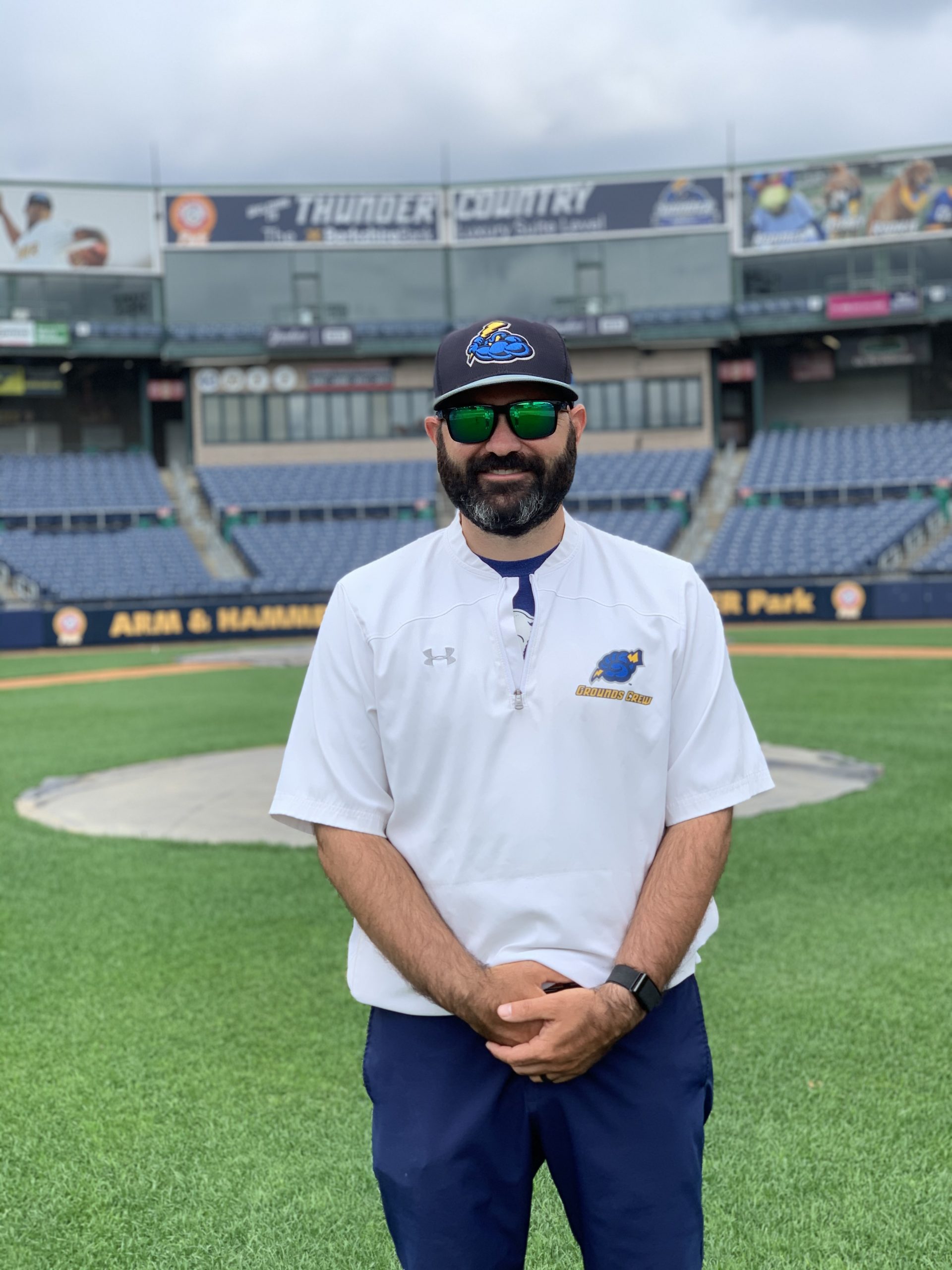The Trenton Thunder Adapts to the Challenges of 2020 with Spiio’s Help:
Movie Nights, Dance Recitals, Tournaments, and Minor League Baseball
Mike Kerns, Director of Grounds for the Trenton Thunder, has had to be creative and flexible to navigate an intense and uncertain year. Spiio sensors help him make smart irrigation and fungicide decisions that keep his field ready for whatever is coming next.

Mike Kerns is the Director of Grounds for the Trenton Thunder Baseball Club, an AA affiliate of the New York Yankees founded in 1980 and located in Trenton, New Jersey. As with many in the turfgrass industry, Mike Kerns’ career began with a summer job. He worked with Llanerch Country Club for several summers and enjoyed the work so much that when an assistant mentioned to him, “You know, you can go to school for this,” he snapped up the opportunity. He studied Turfgrass Management at Rutgers University, graduating in 2009. In 2011 Kerns moved from the country club to help manage the turf for a private school called The Episcopal Academy. Then in 2013, he joined the game day grounds crew for the Philadelphia Phillies, and he moved later that year to be the assistant groundskeeper for the Trenton Thunder. After the 2017 season, Kerns moved on to Manager of Grounds of the Philadelphia Phillies Urban Youth Academy before returning to the Trenton Thunder in November of 2019.
Coronavirus, Creativity, and a Cancelled Season
Not surprisingly, the 2020 season has introduced unprecedented challenges for Kerns and the Thunder. Due to the COVID-19 pandemic, the minor league baseball season for the year was cancelled. Kerns and the rest of the Thunder front office staff have had to be creative to use their space in a way that could return some revenue. Events hosted at Arm and Hammer Park this summer have included baseball showcases, graduation ceremonies, recitals, a movie night, and the Last Dance Tournament (in which 225 high schools have participated). These events have not only supported the park and the team financially, but they have also helped other events to move safely outdoors. They’ve shown how much the Thunder is a part of its community.
“There is definitely no book written for this, but we’re doing our best.”
Mike Kerns

However, Kerns notes that it’s been a strange and difficult shift in many ways. He’s thankful for a good management team that has generally focused its attention on baseball; unfortunately, that means that having to figure out how to prepare the field for a stage is not something that usually falls in the job description. That’s just one example of the kinds of considerations he’s had to make to adapt the field to a very different kind of season. “There is definitely no book written for this,” he says of the situation, “but we’re doing our best.”
How Spiio Sensors Inform Irrigation and Chemical Application
Kerns has five Spiio sensors installed in his field. He primarily values them for the peace of mind they offer. “I can pull it up and see where we’re at in real time,” he says. Especially this season, when so much more work has been moved offsite, the ability to access information about the field has been greatly appreciated. “I can know I’m doing everything in my power,” says Kerns.
“I can pull it up and see where we’re at in real time.”
Mike Kerns

For example, Kerns pointed out that it can sometimes be difficult to judge when to water. He doesn’t have the luxury of watering whenever it’s convenient or best for the field—with practices starting from 1:30 on and games in the evening during a typical baseball season he needs to water overnight and count on it being enough to last through the day. Additionally, there’s a fine balance between not watering enough and watering too much; the combination of heat and humidity can promote disease, so overwatering is more of a threat than it might initially seem. The Spiio’s help Kerns make decisions about irrigation that are based directly on data about what the turf needs, rather than having to rely on guesswork or timetables.
Similarly, Kerns has found that Spiios allow him to time temperature-sensitive fungicides for his turf. Before, the decision to put out fungicides was automatic when June and July hit. Now, Kerns can use the temperature data from the Spiio to know when it’s actually hot enough in the soil to need those chemicals. As a result, he’s found that he can sometimes apply them later and less often.
Spiio allows Kerns to time temperature-sensitive fungicides for his turf. Before, the decision to put out fungicides was automatic when June and July hit. Now, Kerns can use the temperature data from the Spiio to know when it’s actually hot enough in the soil to need those chemicals.
“Is That Real?”
The Thunder are already preparing for their next season, with ticket sales going for off-season games beginning in October. “Everything in minor league baseball is about next year,” says Kerns. “You can’t plan for not having a season because you’ll be behind the 8-ball.” So, he and the team are acting in faith that they’ll have a season, and that it’ll be a good one.

“Everything in minor league baseball is about next year,” says Kerns. “You can’t plan for not having a season because you’ll be behind the 8-ball.”
Mike Kerns
When asked about what makes his job challenging, Kerns acknowledges that every day in minor league baseball is a show. It’s not always necessarily about what’s happening on the field—there’s an entertainment aspect to consider. Then there’s the weather, and Kerns has had to accept that Mother Nature will do whatever she wants to do. That said, Kerns finds his work highly rewarding as well. “There’s nothing like being here alone mowing on a Saturday morning,” he says, “and someone passing by asking, ‘is that real?’” Being up close and personal with the turf—including its imperfections—Kerns sometimes has to create a little distance and take a look at the field from the stands to see the magic that everyone else sees. By delivering data that helps him make precise choices about irrigation, chemical applications, and other turf care, Spiio sensors help Kerns and the Trenton Thunder create that magic.
There’s nothing like being here alone mowing on a Saturday morning,” he says, “and someone passing by asking, ‘is that real?’”

